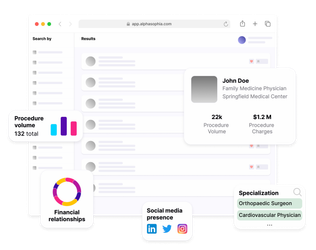The Complete Q&A Guide to Physician Engagement and Activation in Life Sciences

Q1. What is Physician Engagement in Life Sciences?
Answer:
Physician engagement refers to the strategic approach life sciences companies take to build meaningful, sustained relationships with healthcare professionals (HCPs).
It goes beyond one-off sales calls. Physician engagement includes:
-
Providing high-quality, relevant medical education
-
Offering clinical data that supports treatment decisions
-
Facilitating two-way communication
-
Building trust through compliant, transparent marketing
Strong physician engagement is essential in pharma and medtech to improve brand loyalty, support adoption of therapies, and ultimately deliver better patient outcomes.
Q2. How is Physician Activation Different from Engagement?
Answer:
While physician engagement focuses on building relationships and delivering value, physician activation is about driving specific, measurable actions.
For example, activation goals might include:
-
Getting HCPs to prescribe a new therapy
-
Enrolling in patient support programs
-
Participating in clinical trials
-
Attending a webinar or educational event
Pharma marketers often think of the two together: engagement builds trust, activation drives behavior change.
Find any and every HCP, not just the ones looking for a job

Q3. Why Is Physician Engagement So Important for Pharma and MedTech Companies?
Answer:
HCPs are the gatekeepers of prescribing decisions and patient care pathways. Engaging them effectively helps companies:
-
Improve adoption of therapies or devices
-
Communicate complex scientific data
-
Gather real-world insights and feedback
-
Strengthen brand differentiation in competitive markets
In a regulated industry, compliant, high-value engagement is essential to maintain trust and avoid legal or ethical missteps.
Q4. What Are Best Practices for Physician Engagement Campaigns?
Answer:
Top pharma and medtech companies often follow these best practices:
✅ Segment HCP audiences — Tailor messages based on specialty, location, experience.
✅ Offer value-first content — Medical education, guidelines, clinical trial data.
✅ Leverage omnichannel marketing — Combine rep visits, email, webinars, remote detailing.
✅ Ensure regulatory compliance — Adhere to local laws and industry codes.
✅ Enable two-way communication — Let HCPs ask questions, share feedback.
✅ Measure impact — Track engagement metrics and refine tactics.
Q5. How Has Digital Transformation Changed Physician Engagement?
Answer:
The COVID-19 pandemic accelerated digital engagement in pharma. Today:
-
Remote detailing and e-Rep calls are common.
-
Virtual webinars and medical education have become staples.
-
Omnichannel orchestration enables coordinated messaging across email, in-person, and digital channels.
-
Advanced analytics help companies personalize outreach.
Digital channels can boost reach, frequency, and cost-effectiveness — while still offering HCPs flexibility.
Start Your Omnichannel Strategy with Alpha Sophia

Q6. What Is Omnichannel Physician Engagement?
Answer:
Omnichannel engagement means delivering coordinated, personalized content across multiple touchpoints:
✅ In-person visits with sales reps
✅ Remote detailing or video calls
✅ Email campaigns
✅ Web portals or apps
✅ Social media (where allowed)
✅ Webinars and medical conferences
Rather than siloed channels, omnichannel strategies use data to sequence and personalize communication — improving impact and satisfaction.
Q7. How Do You Measure Physician Engagement and Activation?
Answer:
Pharma and life sciences companies track metrics like:
-
Open and click rates on email campaigns
-
Rep visit frequency and duration
-
Remote detailing session participation
-
Webinar attendance and engagement
-
Self-service portal logins
-
Prescribing trends (where legally trackable)
-
Surveyed satisfaction scores
Pro tip: Measurement isn’t just about volume — it’s about quality of interactions and evidence of behavior change.
Q8. What Role Do KOLs Play in Physician Engagement?
Answer:
Key Opinion Leaders (KOLs) are trusted, influential clinicians who help educate peers and shape practice guidelines.
Effective physician engagement strategies often involve:
-
Identifying KOLs within therapeutic areas
-
Building long-term, transparent relationships
-
Collaborating on medical education
-
Involving KOLs in advisory boards, clinical trials, content development
Q9. How Can Pharma Ensure Physician Engagement is Compliant?
Answer:
Compliance is critical. Best practices include:
✅ Following local marketing codes (e.g., PhRMA, EFPIA)
✅ Transparent reporting of transfers of value
✅ Ensuring fair balance in educational materials
✅ Avoiding off-label promotion
✅ Documenting interactions accurately
Failing to follow compliance rules can lead to fines, reputational damage, and loss of trust.
Q10. What Are Emerging Trends in Physician Engagement?
Answer:
✅ Personalization driven by data and AI
✅ Increased use of remote engagement and hybrid field teams
✅ Self-service portals for on-demand content
✅ Integration of real-world evidence into discussions
✅ Greater patient-centric focus in messaging
✅ Value-based storytelling over pure product features
Q11. What Are the Best Tools for Physician Engagement and Activation?
Answer:
Effective physician engagement requires more than just strategy — you need the right technology to execute, measure, and optimize campaigns.
Here are top recommended tools used in pharma and life sciences marketing to improve HCP engagement and activation:
1. Alpha Sophia
Alpha Sophia offers advanced HCP segmentation and targeting for life sciences brands. Its platform helps you:
-
Identify the most relevant physicians for your product
-
Prioritize outreach with data-driven insights
-
Customize messaging by specialty, location, and behavior
-
Improve campaign ROI with precise segmentation
Alpha Sophia is particularly well-suited for companies that want to move beyond mass email marketing and adopt smart, data-backed engagement strategies.
2. Veeva CRM and Veeva Engage
Veeva is one of the most widely used CRM platforms in pharma. It supports:
-
In-person and remote detailing
-
Call planning and compliance tracking
-
Sample management
-
Approved email and content sharing
-
Virtual meeting solutions for HCPs
3. IQVIA Orchestrated Customer Engagement (OCE)
IQVIA’s OCE suite is built for life sciences companies looking to deliver truly omnichannel engagement:
-
Field rep support tools
-
Integrated email, portal, and call planning
-
Advanced analytics and reporting
-
Customer journey mapping
4. Salesforce Health Cloud
While broader than just pharma, Salesforce Health Cloud is used for HCP engagement strategies like:
-
Personalized communication journeys
-
Secure collaboration tools
-
Patient and HCP data management
-
Campaign automation
5. Medscape Education
For medical education-focused engagement, Medscape offers:
-
Accredited CME content distribution
-
Sponsored educational programs
-
Physician forums and peer discussion
-
Targeted ad placements within clinical content
6. Doximity
A professional networking platform specifically for U.S. physicians, Doximity enables:
-
Targeted sponsored content
-
Secure messaging and updates
-
Advertising within physician workflows
-
Digital recruitment and telehealth integrations
Conclusion
Physician engagement and activation are at the heart of effective life sciences marketing. By focusing on value-first, compliant, and personalized interactions, pharma and medtech companies can build trust, drive adoption, and ultimately improve patient outcomes.
